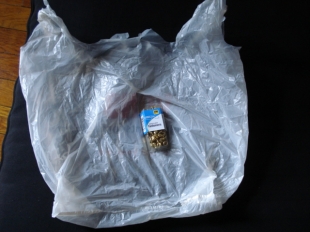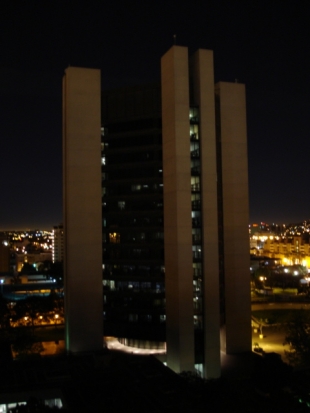On occasion there’s talk about Long Beach being or becoming a “green” city. This, for example, from a news story on Long Beach vis-à-vis Earth Week 2009:
“Long Beach uses a combination of innovative solutions and simple, yet effective, steps to eliminate waste as we move towards our goal to become a sustainable city,” said Mayor Bob Foster. “Our City has already been recognized with many environmental awards, and we continue look for more opportunities to develop and implement more green programs*.”
If the mayor is right—that we as a City are really looking for opportunities on this front—we might address the culture of selfishness and waste within which we are immersed on a day-to-day basis. Because whatever else a city may be, it is very much its denizens. And if they (we) are uninterested in even the basics of eco-consciousness, the effectiveness of all other efforts in this direction is necessarily rangebound.
I don’t wish to compile a list of “green” tips—there are people far better qualified to do so (hell, I’ve only recently made the switch from paper to cloth napkins—and that’s pretty much a no-brainer); rather, here are a half-dozen meditations on emblematic experiences I’ve had during my orbits within Long Beach, offered hopefully so that some obvious chances to reduce waste might cease to be overlooked.
1. The other day in the checkout line at Albertsons I watched a man in front of me wipe his hands with one of those wet-naps, crumple and discard it into his now-empty grocery cart, then roll the cart out of the way. “Hey, a**hole, that’s not cool,” I said. No, actually: “Excuse me, I think you dropped something in your cart.” Concerned, he walked over to it, then realized what I was talking about. “Oh,” he smiled, “it’s just some napkin thing. But thank you.” Ugh. Now instead of shaming this jerk, I’d made him feel good that some stranger showed concern for his well-being. Okay, so that didn’t work. But wasn’t it worth trying something? Where does peer pressure factor into the equation that converts bad, needless behavior on the part of our fellow citizens?
 2. Supermarkets. Vons, it seems, doesn’t even carry paper bags anymore; if you haven’t brought your own, you get plastic. As for Albertsons, consider the pertinent accompanying pictures. I came through the checkout line with a pocket-sized package of brass fasteners. Without even asking if I wanted a bag, the cashier swooped my tiny purchase into a plastic bag. “No bag,” I said, intentionally omitting “please” in my disgust at such a callous disregard for reasonableness, never mind the environment.
2. Supermarkets. Vons, it seems, doesn’t even carry paper bags anymore; if you haven’t brought your own, you get plastic. As for Albertsons, consider the pertinent accompanying pictures. I came through the checkout line with a pocket-sized package of brass fasteners. Without even asking if I wanted a bag, the cashier swooped my tiny purchase into a plastic bag. “No bag,” I said, intentionally omitting “please” in my disgust at such a callous disregard for reasonableness, never mind the environment.
3. I belong to Bally’s Total Fitness. I haven’t seen the women’s locker room, but in the men’s the sink faucets are such that unless you’re very deliberate in how you turn them on, you get water jetting with at least five times the pressure you could possibly need unless you were cleaning dishes without a sponge. Really, you can almost lose a finger. I can’t tell you how many times I’ve seen someone mindlessly leave the thing gushing as he casually shaves, keeping that little torrent going so as to rinse his razor once every 20 seconds. I wrote to Bally’s expressing my opinion that they ought to reduce the pressure and/or install motion-activated faucets or something: they wrote back saying they are very concerned about such things and would look into it. If they have, apparently they’ve come to the conclusion that it’s better the way it is, because it’s six months later and nothing’s changed.
4. We’re very lucky with coffeehouses in Long Beach. If for some inscrutable reason you want to go to a chain, you’ve got your pick; but there’s no need: you’ve got an embarrassment of riches when it comes to indies. At the chains (and even some of the indies), if you don’t want to use a paper cup, you better keep your eye on the barista, because even if you say you want your drink for her, the default is to go for the disposable. “I said ‘for here,’” I’ve called many times while watching it happen, “for here . . . FOR HERE!” The exclamation point usually stops him/her, and as a response I get a perplexed, “You want that in a mug?” Then there are more subtle problems. Viento y Agua is the only place I know of that seems to get it all right: you get 10% off just for riding your bike there, there’s a little bin for disposing of recyclables (ever think about how much paper a year is gone through by way of emptied sugar packets?), the staff wouldn’t think about giving you a disposable cup unless you expressly ask, etc. Every other place I go to could make some easy improvements. At my favorite hang, Portfolio, for example, if you want water, you’re going to be using a disposable cup; and for the life of me I can’t figure why they even carry paper plates and plastic spoons—because wouldn’t you be using those for things you’re eating there? I know going all ceramic and metal would mean more work for the employees (though presumably that would translate into more pay for the extra time required of them), but shouldn’t we be willing to do a little more work for increased sustainability?
5. In my capacity as a theatre critic I have attended some lovely opening-night receptions at the International City Theatre. I am always dismayed, though, by seeing the number of paper plates and plastic champagne flutes that are gone through. Turn your back on your empty flute and a banquet server will swoop in and deposit it into the garbage, leaving you to use a new one if you want another glass (which I do). Ideally the ICT would keep non-disposable stuff on hand for these events, but if that’s too much to ask, might the well-meaning employees be coached that it’s okay to let us reuse our plates and cups before trashing them?
 6. More fun with pictures. You may not recognize the downtown courthouse, but I’m sure you recognize City Hall. See all those lights on? This shot was taken at 2 a.m. on August 4th.—though it looks basically the same every night at this time. Mr. Mayor, if I might revisit your above-cited words, since “Long Beach uses a combination of innovative solutions and simple, yet effective, steps to eliminate waste as we move towards our goal to become a sustainable city,” might we consider light-timers or some other means to get our city employees not to leave lights burning all night? Because, clearly, a lot of these employees don’t get it. (I shudder to think how many computers are left on stand-by—or worse.)
6. More fun with pictures. You may not recognize the downtown courthouse, but I’m sure you recognize City Hall. See all those lights on? This shot was taken at 2 a.m. on August 4th.—though it looks basically the same every night at this time. Mr. Mayor, if I might revisit your above-cited words, since “Long Beach uses a combination of innovative solutions and simple, yet effective, steps to eliminate waste as we move towards our goal to become a sustainable city,” might we consider light-timers or some other means to get our city employees not to leave lights burning all night? Because, clearly, a lot of these employees don’t get it. (I shudder to think how many computers are left on stand-by—or worse.)
Undoubtedly you have your own similar stories (which I’d love to hear), and what they all add up to is a city (and a state, and a country, and a planet) where the message still hasn’t gotten through that the best way to conserve is not by way of the grandiose programs and gestures—as good as those may be—but simply by internalizing an ethos of: Don’t use it if you don’t have to. I think there’s a place for disposable products, for plastic bags and jets of water, for lights that stay on most of the time; I just think that place is a lot smaller than the space it’s currently consuming.
*From Government Fleet Top News (click here to read)

